Thinking of adding some web-footed friends to your flock and wondering “How long do ducks live?”
Well, it’s a pretty good question – after all, you want your pets around for a while! Truthfully, ducks are wonderfully hardy creatures that are relatively easy and fun to care for.
However, they’re not exactly like chickens. They tend to get lumped in the same category by default, but a domestic duck has its own separate needs. And understanding how to raise ducks so they’re healthy is key to increasing your pet duck’s lifespan.
And not all ducks are alike!
In this article, you’ll discover different breeds of ducks, basic care, and how long ducks live in general.
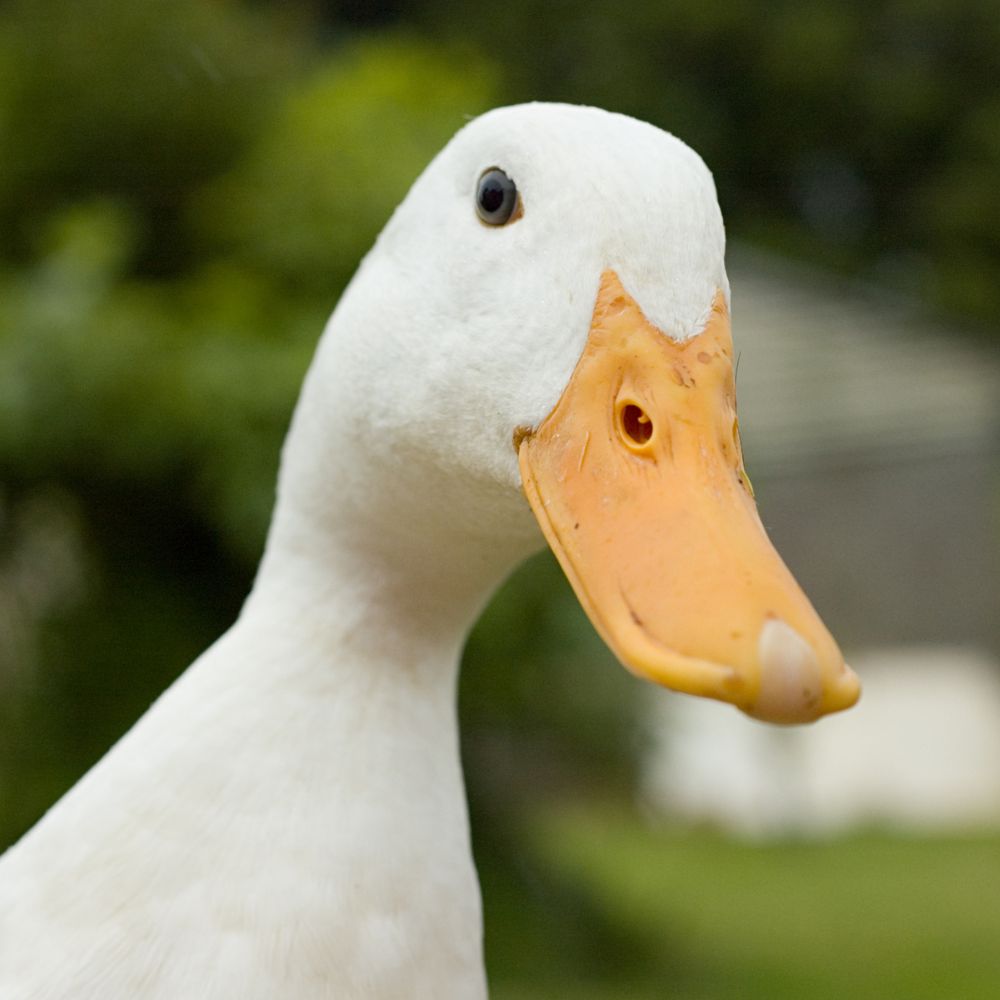
Table of Contents (Quickly Jump To Information)
Factors That Affect How Long Ducks Live
In general, most ducks live about 5 years, and possibly up to 10 years. That’s a big span, I know. How long ducks live depends largely on a few different factors. Let’s briefly talk about several of the key areas, and how they affect your duck’s lifespan.
Housing
Do your ducks have a warm, accessible structure to call home? The quality of your duck house will contribute to how long they live. After all, the elements can definitely take a toll on your ducks’ health! (Especially summer heat).
A duck house doesn’t have to be fancy – it just has to keep them dry, have good ventilation, have enough room for each animal. They will need about 4 square feet inside per bird and 10 square feet of space outside per bird (unless they are free ranged), and protect them from predators.
If your coop doesn’t have good ventilation during the summer, you can learn how to install a DIY window here.
Protection
Unlike chickens, ducks don’t roost, and they have even fewer defenses against predators (basically, they can try to run away or go into a pond). The term “like a sitting duck” means easy pickings for a reason!
Without adequate protection from predators, you’ll likely lose your flock pretty quickly. Answering the question “How long do ducks live?” largely depends on how well they’re protected from predators.
Ducks can fall victim to the same predators that your hens fear. Examples include:
- Coyotes
- Skunks (especially ducklings)
- Dogs
- Bears
- Raccoons
- Opossums
To protect your ducks, they’ll need a critter-safe run, and a coop that predators can’t get into at night. While hardware cloth is best, chicken wire is cheaper to purchase. You can figure out the best chicken wire here for your particular situation.
Diet
I can’t underscore enough how important diet is, especially during the first few months of your duck’s life. Unlike chickens, ducklings need more vitamin B (particularly niacin) to grow.
Without it, their bones and bills might not grow correctly. You might notice their bills don’t come together (meaning the duckling can’t properly close its mouth). Or, they might not be able to walk correctly because their legs are crooked. These can be debilitating issues that’ll affect how long ducks live.
You can feed your ducklings a feed that’s specific to their needs, or combine brewer’s yeast with chick starter. Both are great.
For adult ducks, especially laying hens, you’ll want to feed a 16% protein layer feed that has calcium in it. (Or offer oyster shells as a calcium supplement separately).
You’ll also want to make sure your hens have access to clean water, herbs as a dietary supplement, and extra treats such as black soldier fly larvae or dried shrimp (a particular favorite of our ducks!).
You can learn more about what baby ducks eat here and alternative feeds for adult ducks here.
Veterinary Care
I’m not going to go too in-depth on this subject, because it pretty much stands to reason that if you don’t provide adequate veterinary care when needed, your ducks might not live as long.
Some common issues with ducks are:
- Bumblefoot (read more about bumblefoot here)
- Upper respiratory issues
- Worms (read more about worms here)
- Trampling by other ducks
Exposure to Drakes
While drakes are necessary if you want to hatch eggs, they’re also a real pain if you have too many. You can read about the best incubators for hatching duck eggs here.
Male ducks can be pretty aggressive with the females, especially while mating. If you own more than 1 drake for every 10 duck hens, you might find yourself without some duck hens, or at least very battered ones.
When they’re competing, drakes will successively mate with a hen (meaning, each drake has to have a turn), even when they’re in the water. Realistically, this can cause the hen to drown because her head is constantly pushed underwater. If you’re wondering how long do ducks live in this situation, the answer is: Not long. Maybe 2-3 minutes.
When on dry land, this behavior can cause your hen to be crushed, or it can break her back. If possible, it’s best to limit the number of drakes in a flock to ensure everyone’s health and safety.
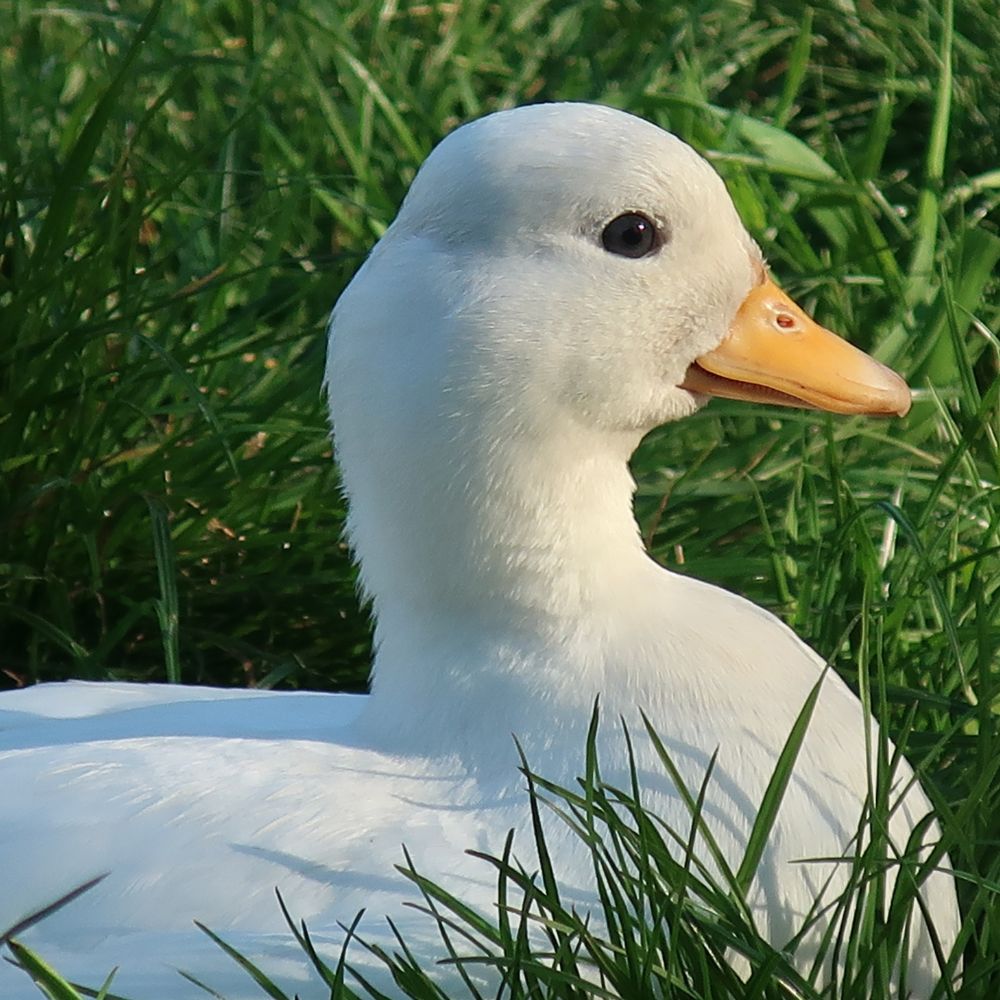
Related Duck FAQ
What’s the Longest Living Duck Breed?
The longest reported living duck breed is the Pekin duck, although some owners report that a Muscovy duck can live between 8 to 12 years on average (there have been records of domesticated Muscovy ducks that lived longer, however).
What’s the Longest a Duck Has Ever Lived?
The oldest on record is a female mallard called Desi, owned by Ingrid Raphael from Maidenhead, Berkshire, United Kingdom. Desi lived 20 years 3 months and 6 days before her death in August 2002. The average white duck’s lifespan is about 5 to 10 years.
Do Ducks Make Good House Pets?
Ducks can make good house pets, especially if hand raised. They’re cheerful creatures who love spending time dipping their bills in water and searching for goodies. They are quite messy and need access to water…so it’s a pretty big commitment to have an indoor duck.
If you decide to try it, make sure you use a chicken diaper. Ducks (like other bird breeds) don’t have bladders, so they poop everywhere. So, you’ll need a plan! Ducks also molt, so you’ll need to figure out how you’ll deal with all those feathers.
How Do You Keep a Pet Duck?
You can keep your pet duck in the house (more challenging) or outside (the most common and easiest option). They’ll need food, a safe house (because they’re susceptible to many predators), and veterinary care.
They will also need access to water, since that’s how they clean themselves and it’s where they are happiest. You will also need to use duck diapers because ducks poop everywhere. You can read more about raising ducklings here.
Best Duck Breeds For Pets
From my experience and knowledge, I have a list of duck breeds that I think are the best pet ducks out there. Let’s look at each breed so you can decide which one might be best for you.
Pekins
This is the most common breed – they start as yellow chicks, and become white when they grow into adults. They’re wonderful layers, that will give you large, white eggs. They’re generally healthy and can be quite large.
What is the Lifespan of a White Duck?
When someone asks about the life expectancy of a white duck, they’re usually referring to Pekins. The Pekin duck’s lifespan is about 5 – 10 years, with the longest living 20 years. A lot of people ask about “the yellow duck lifespan, “ referring to Pekins since their down is yellow when they’re born.
How Long Do Pekin Ducks Live?
The average lifespan of the Pekin duck is 5 to 10 years. This depends on a variety of factors including housing, diet, care, and more.
Cayugas
These are smaller black ducks (completely black from bill to webbed feet). Cayugas are great layers – they can lay black (or dark grey) eggs and these eggs might fade to white or light grey during her lifespan.
You can read more about Cayuga ducks here: Cayuga Duck – Ultra Cool Duck Breed
Call Ducks
These are small ducks (bantam size) mostly kept for companionship. Unlike other breeds, they weigh around 3 pounds. They’re good layers of white eggs, and they also tend to be quieter than other breeds.
Call ducks are adorable in every way and look a bit like stuffed animals or animated characters.
Call ducks make great pets because they’re small and fairly quiet. Like most ducks, it’ll depend on how you raise them.
Hand-raising them means they’re more likely to be friendly (since ducks have a prey instinct, they can be fearful of humans if they don’t interact with them consistently). Be sure to feed your call ducklings lots of treats to make them your friend!
Call ducks can live up to 10 years, depending on their environment. You’ll want to make sure they have access to good housing, fresh feed, and plenty of water.
Indian Runner
This is an easily identifiable breed – they stand more upright than other ducks. They’re wonderful layers who love treats. They come in various colors, including fawn and blue.
Read all about these ducks in this great article: Runner Ducks 101
The Indian Runner Duck lifespan is about 8 to 12 years.
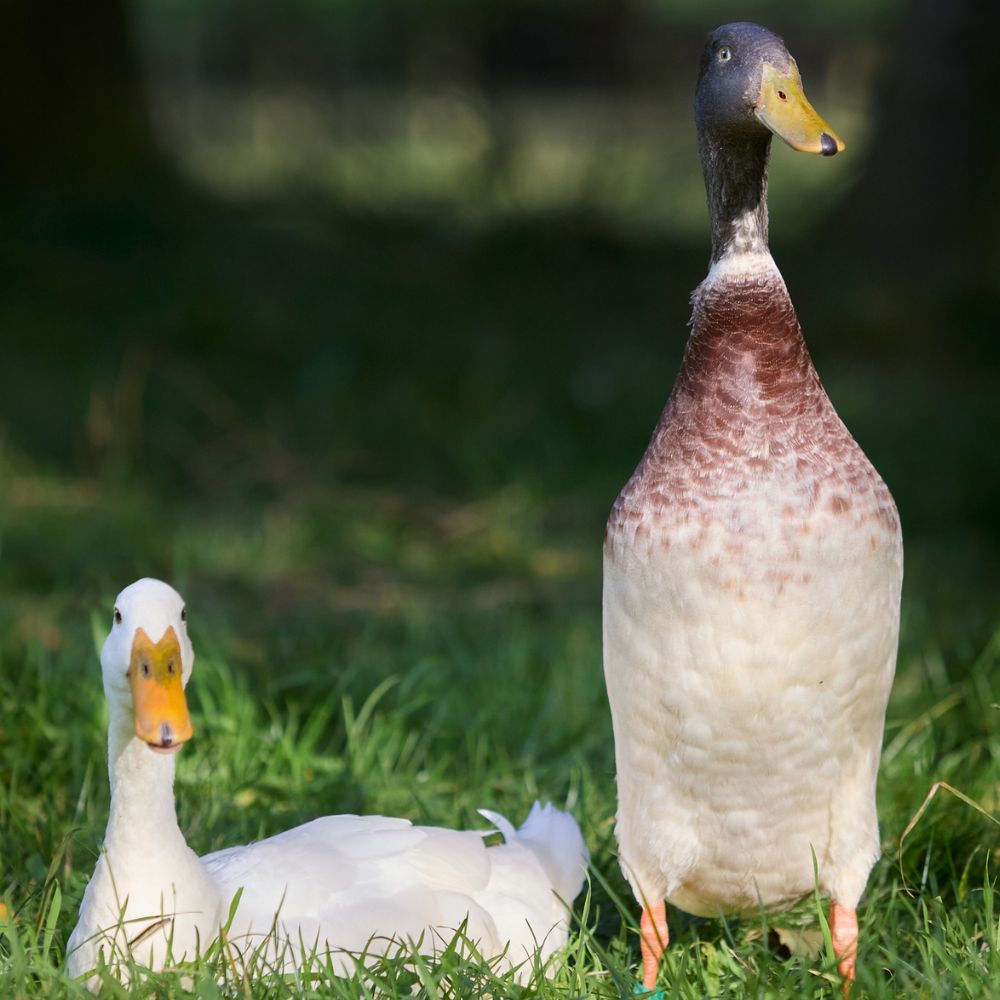
Khaki Campbell
This is a brown duck breed that lays wonderful white eggs. They’re prolific layers, and while the females tend to stay small, the males will get quite large. If you want eggs as an added benefit to your webbed footed pets, then Khaki Campbells are likely your best choice.
Khaki Campbell ducks are quite friendly and popular, however they need to be handled a lot to keep them from being skittish. Learn more about this favorite in this article: Khaki Campbell Ducks – An Amazing Duck Breed You Will Love.
Khaki Campbell ducks live about 10 to 15 years.
Muscovy Ducks
Muscovies have similar bodies to most ducks, however, they are very distinctive looking. They have red faces with a raised, fleshy area called a “caruncle.” The males (also called drakes) usually developed the caruncle earlier and are more pronounced that the females.
The caruncle is such that you will probably love it, or hate it. You’ll have to be the judge.
This breed of duck, with its red face and friendly personality, is a great addition to any flock. You’ll get white eggs and be able to watch them hatch ducklings. You’ll also enjoy seeing them gobble goodies from the water, and generally love life!
Like most ducks, Muscovies live between 5 to 10 years, depending on their environment. You can read more about Muscovy ducks here.
Mallard Ducks
Mallard ducks are wild ducks and almost all duck breeds will lead back to Mallards. They are the foundational breed in the duck world.
There are hatcheries that sell Mallard ducks, so although they are “wild” you can have them as pets too.
As opposed to the Pekin duck lifespan and the Indian Runner duck lifespan, Mallard ducks only for as long as 3 to 5 years in the wild.
A pet mallard duck is a good pet for as long as you know how to properly care for them. It’s always best to get your mallards from a reliable hatchery, rather than try to domesticate a wild duck (which might be illegal in some states). You can check out common hatcheries here.
Ducks As Pets Pros And Cons
Pros:
- You’ll get eggs!
- They’re easy to care for (read more here)
- They’re friendly
- They’re unusual pets
Cons:
- Ducks poop A LOT
- Predators can pick them off easily (learn how to build a safe coop here)
- Drakes can quack loudly
- They need a pond or pool
Bonus Question: Will Pet Ducks Fly Away?
It’s possible, but unlikely. Most domestic breeds can’t fly very well because they’ve been bred to be large. Their wings can’t get enough air. You’re far more likely to lose your ducks because of predators (which will decrease how long they live).
Maat van Uitert is a backyard chicken and sustainable living expert. She is also the author of Chickens: Naturally Raising A Sustainable Flock, which was a best seller in it’s Amazon category. Maat has been featured on NBC, CBS, AOL Finance, Community Chickens, the Huffington Post, Chickens magazine, Backyard Poultry, and Countryside Magazine. She lives on her farm in Southeast Missouri with her husband, two children, and about a million chickens and ducks. You can follow Maat on Facebook here and Instagram here.

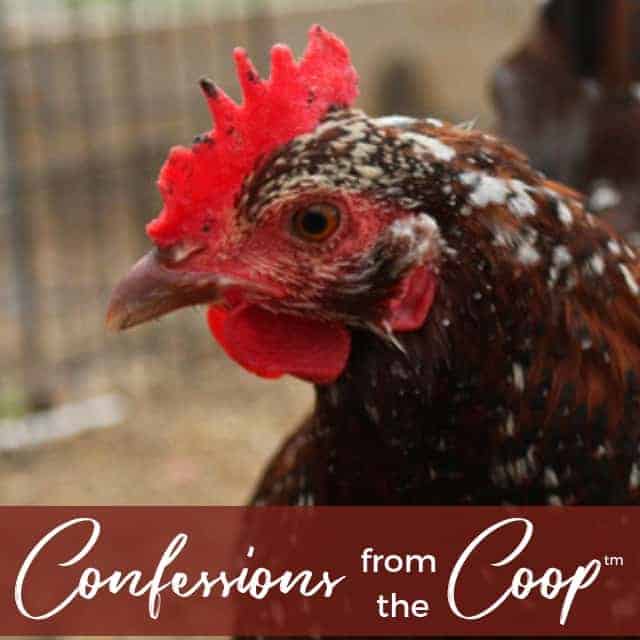
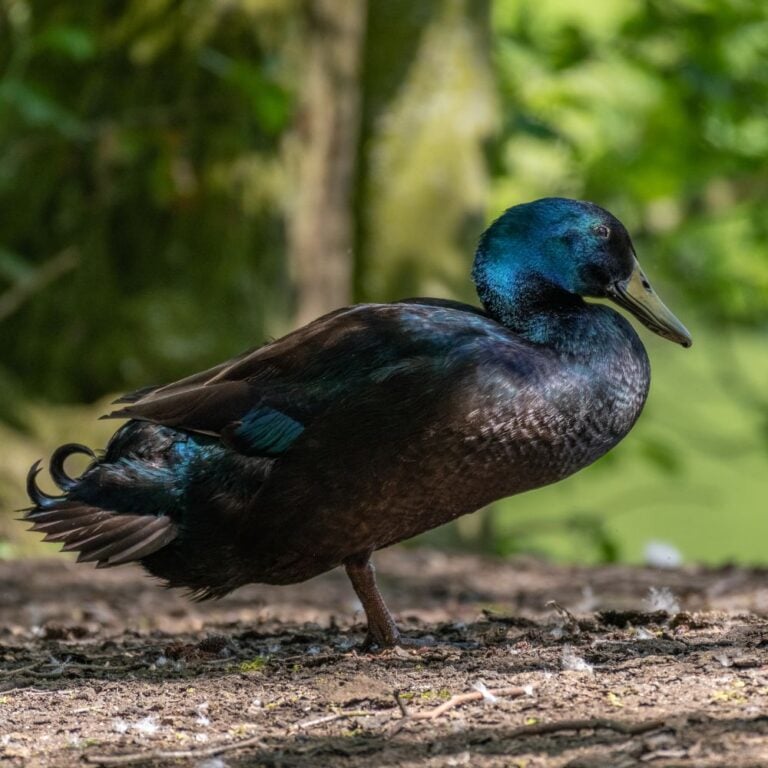
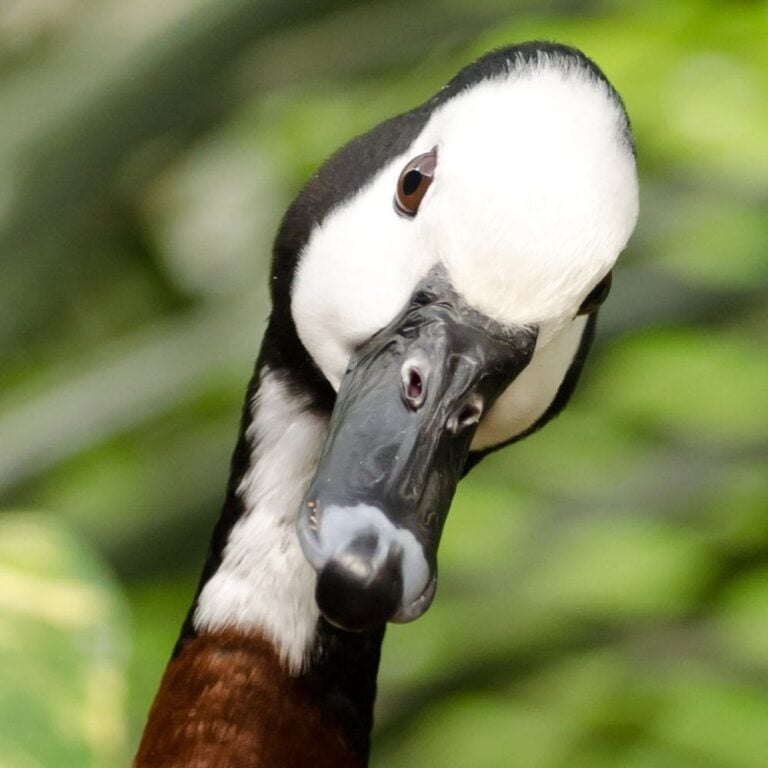
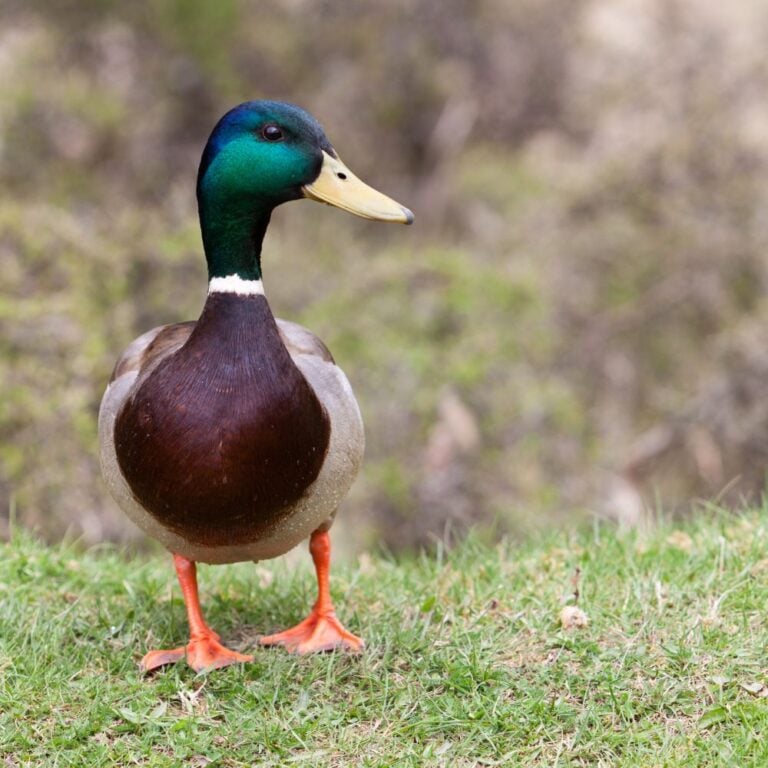
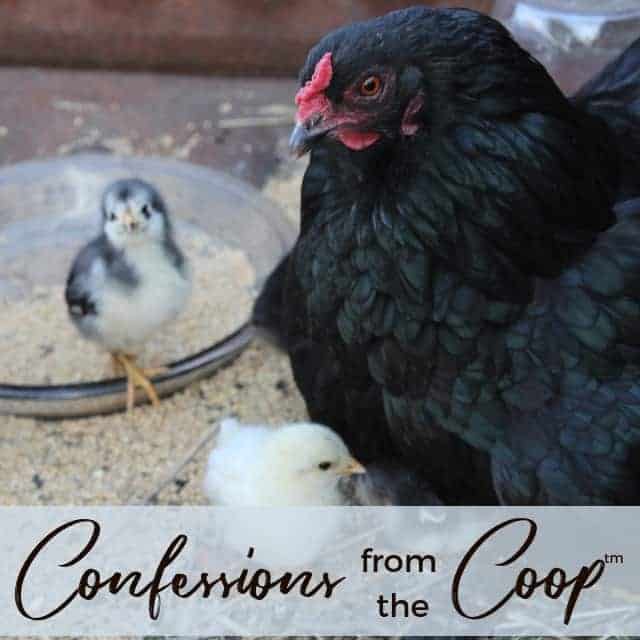
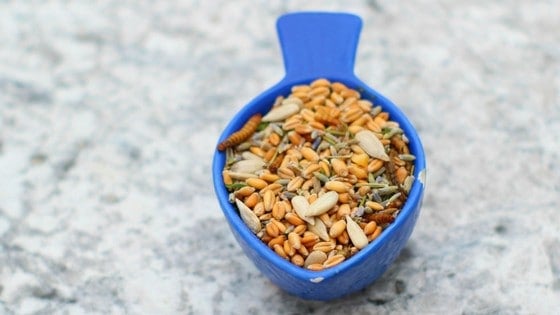
I have 3 ducks. One I’ve been able to identify as a Khaki Campbell. How do I tell if it’s a drake or hen? They are about 2 months old.
The other 2, one is gray with a few black feathers and the largest of the 3. The other is solid black, beak to feet and the smallest of the three. Ideas as to breed?
Hi Linda, the drakes will have a drake feather (a curly feather) on their tails. 2 months is a little young to get it though. I also tell by quacks – the females will develop a deeper quack faster, while the males will still squeak. The solid black duck is probably a Cayuga – I have 2 and they lay dark eggs. Not sure about the grey with black feathers – can you send me a photo?
I accidentally deleted this link and finally found it. The brown one I think is a Khaki Campbell. It doesn’t really quack, more like squeaks. The other two are very vocal.
How do I send pics?
I accidentally deleted this link and finally found it. The brown one I think is a Khaki Campbell. It doesn’t really quack, more like squeaks. The other two are very vocal.
How do I send pics?